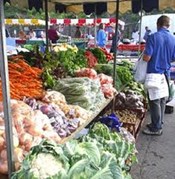National Farmers Market Week is August 4th-10th! Support your local farmers and take advantage of the healthy foods they offer by visiting a nearby farmers market.
One of the pleasures of summer for many people is shopping at the local farmers’ market. In fact, buying at farmers’ markets is becoming a habit for growing numbers of Americans. More than one million people purchase goods from their local market each week, supporting 20,000 American farmers in the process, according to the U.S. Department of Agriculture.
While farmers’ markets offer food at the peak of freshness, even fresh produce can be a source for foodborne illness. That’s why it’s important to carefully select and handle fresh produce that you purchase, says University of Wisconsin-Extension food safety specialist Barbara Ingham.
“Most people know that animal products must be handled carefully to avoid illness, but fruits and vegetables can also become contaminated,” says Ingham. “Animals, substances in the soil or water, or even poor hygiene among workers can be the source of bacteria. And after the produce is harvested, it’s handled by a variety of people, which can increase the risk for contamination.”
To help protect your health and to enjoy fresh produce at its best, Ingham says to choose produce that isn’t bruised or damaged. Bruising or damage to tissue can allow microorganisms a chance to ‘take up residence’ in your favorite summertime treat, she says
Fortunately, a farmers’ market offers the advantage that most produce is not sold packaged, making it easier to choose the best quality. And any pre-cut items, such as melon slices or diced tomatoes, should only be purchased if kept cold at the market, and then should be refrigerated upon reaching home.
In addition to choosing high quality produce, Ingham reminds consumers that carefully handling and preparing fresh fruits and vegetables at home are important food safety steps.
Almost all fresh produce should be refrigerated as soon as you return from the market. Proper refrigeration helps to ensure safety by reducing the chance that microorganisms will grow and it also helps to preserve quality.
Different fruits and vegetables require varying temperature and humidity levels for proper storage. Some of the foods that taste best stored at room temperature include melons, onions, potatoes, sweet potatoes, tomatoes and winter squashes. Store them in a clean, dry, well-ventilated place, away from direct sunlight and areas where meat is prepared.
Ripen some types of produce on the counter and then store in the refrigerator; nectarines, peaches, pears and plums fall into this category. Most other fresh fruits and vegetables keep best stored in a clean refrigerator at a temperature of 40 degrees Fahrenheit or below. Use your refrigerator crisper drawer for whole produce. And store fruits in a separate refrigerator drawer from vegetables.
When preparing fresh produce, begin by washing your hands for at least 20 seconds with soap and warm water; then follow these simple steps:
–Cut away any damaged or bruised areas.
–Wash produce thoroughly. Rinse it under clean, running water just before preparing or eating. “Don’t use soap or detergent as it can get into produce and make you sick,” says Ingham. Rub firm produce such as potatoes or apples briskly, scrubbing with a clean brush or your hands to clean the surface. For delicate produce such as berries, rinse well and drain. Dry with a clean cloth or paper towel. Ingham cautions that fresh produce should be washed just before preparing, not before storage.
–Wash produce before you peel it, so dirt and bacteria aren’t transferred from the knife
–Store any cut or peeled fruits and vegetables in a bag or covered container in the refrigerator.
“Aim to buy foods you’ll eat soon, while they’re fresh,” says Ingham. “Select an amount you can use within a short time.”
Take a few simple precautions as you enjoy all the goodness that a farmers’ market has to offer! For more information on food safety, go to www.foodsafety.gov.
Source: University of Wisconsin Extension







